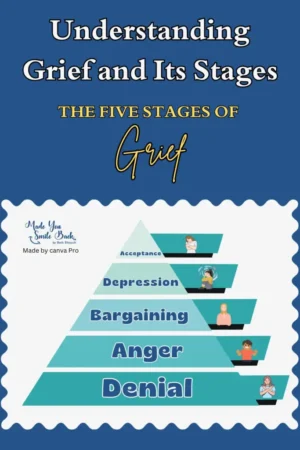Depression
Depression and How it Affects Baby Boomers
Depression among Baby Boomers is a critical health concern that often goes underdiagnosed and untreated. As this generation ages, understanding the nuances of depression becomes increasingly important for effective treatment and improved quality of life. Baby Boomers face unique challenges and life transitions that can trigger or exacerbate depressive symptoms, such as Retirement, the loss of loved ones, and increasing physical health issues. Addressing their Mental Health needs is not only crucial for their well-being but also for the healthcare system that supports them.
In this section of the site, we will touch upon the common form of depression, major depressive disorder, which can cause significant impairment in daily functioning and is characterized by persistent sadness and a lack of interest in previously enjoyed activities. We will look at Dysthymia (Persistent Depressive Disorder), which is a milder, but chronic, form of depression that lasts for two years or more. It often affects baby boomers, especially those who might not have addressed or recognized their depressive symptoms early on. We will also explore Bipolar Disorder, Seasonal Affective Disorder (SAD) and depression resulting from chronic illnesses.
Depression Specialists & Contributors
Podcasts About Depression
Books About Depression
Explore Content About Depression

Allan Knight, a former Zen Monk, along with Anika Jackson, Zen Power Coach in Training, guide individuals through this process in the Zen Activation Program. Explore the essential role of effective communication in relationships, offering valuable advice on overcoming common barriers and improving c…
Allan Knight, a former Zen Monk, along with Anika Jackson, Zen Power Coach in Training, guide individuals through this process in the Zen Activation Program. Explore the essential role of effective co…
Allan Knight, a former Zen Monk, along with Anika Jackson, Zen Power Coach in Training, guide individuals through this process in the Zen Activation Program. Explore the essential role of effective communication in relationships, offering valuable advice on overcoming common barriers and improving connection. Emphasizing the importance of self-communication—understanding and reflecting on one’s own thoughts and feelings—as the foundation for healthier interactions with others, both share personal stories about how insecurities and past experiences have shaped their relationships and how …

On the next episode of The MisFitNation Show, host Rich LaMonica welcomes Deborah Heiser, Ph.D., an Applied Developmental Psychologist, TEDx speaker, and Founder of The Mentor Project. Dr. Heiser’s extensive career spans research on aging, depression, dementia, and frailty, with published work in …
On the next episode of The MisFitNation Show, host Rich LaMonica welcomes Deborah Heiser, Ph.D., an Applied Developmental Psychologist, TEDx speaker, and Founder of The Mentor Project. Dr. Heiser’s …
On the next episode of The MisFitNation Show, host Rich LaMonica welcomes Deborah Heiser, Ph.D., an Applied Developmental Psychologist, TEDx speaker, and Founder of The Mentor Project. Dr. Heiser’s extensive career spans research on aging, depression, dementia, and frailty, with published work in peer-reviewed journals and features in prominent outlets like The New York Times and Thrive Global. She has received grants from NIA/NIH and Pfizer, and earned international recognition for her groundbreaking research. Join us for a deep dive into aging, psychology, and mentorship on this episode.Ch…

In this episode of the EZ Conversations podcast, Furkhan sits down with Dr. Henderson to explore the revolutionary impacts of infrared light therapy. Dr. Henderson shares his journey from music to medical school and discusses his groundbreaking work in infrared light therapy, touching on its benefit…
In this episode of the EZ Conversations podcast, Furkhan sits down with Dr. Henderson to explore the revolutionary impacts of infrared light therapy. Dr. Henderson shares his journey from music to med…
In this episode of the EZ Conversations podcast, Furkhan sits down with Dr. Henderson to explore the revolutionary impacts of infrared light therapy. Dr. Henderson shares his journey from music to medical school and discusses his groundbreaking work in infrared light therapy, touching on its benefits for conditions like PTSD, depression, and traumatic brain injury. The conversation delves into the science behind infrared light therapy, including its effects at different wavelengths and intensities, and highlights ongoing research and practical applications. Listeners also learn about the poten…

Thomas set off backpacking at 18 years old, as a way of avoiding the real responsibilities of life. This was great for a while, but after 7 years of travelling, he was broke, unqualified, and without direction, leading to depression. At 25, he checked into therapy, got into the gym, joined universit…
Thomas set off backpacking at 18 years old, as a way of avoiding the real responsibilities of life. This was great for a while, but after 7 years of travelling, he was broke, unqualified, and without …
Thomas set off backpacking at 18 years old, as a way of avoiding the real responsibilities of life. This was great for a while, but after 7 years of travelling, he was broke, unqualified, and without direction, leading to depression. At 25, he checked into therapy, got into the gym, joined university as a "mature student", and then put myself through financial qualifications in order to become a Private Wealth Manager. Having been through this myself, I want to help others going through the same period, and share his advice on fitness, finance, and purpose.Instagram: TomgmurrTiktok: TomgmurrYo…
We Shall Overcome Someday In the journey of life, Baby Boomers have faced numerous challenges, many of which are unique to our generation. We shall overcome someday was the anthem we grew up with during the civil rights movement where overcoming racial injustice was part of the story of our generat…
We Shall Overcome Someday In the journey of life, Baby Boomers have faced numerous challenges, many of which are unique to our generation. We shall overcome someday was the anthem we grew up with dur…
We Shall Overcome Someday In the journey of life, Baby Boomers have faced numerous challenges, many of which are unique to our generation. We shall overcome someday was the anthem we grew up with during the civil rights movement where overcoming racial injustice was part of the story of our generation. In today's world, we are still looking to overcome challenges like ageism, addiction, depression, fear, adversity, self-doubt and the rapid evolution of technology. Our experts in this area of the site dive into the key areas where Baby Boomers may struggle and help provide insights into how we…

In today's episode, Gina finishes her interview with Doctor Fred Moss, a knowledgeable and experienced psychiatrist who is committed to helping patients removing unneeded medications from their lives. Psychiatric medications have a track record for making worse and even causing psychiatric symptoms …
In today's episode, Gina finishes her interview with Doctor Fred Moss, a knowledgeable and experienced psychiatrist who is committed to helping patients removing unneeded medications from their lives.…
In today's episode, Gina finishes her interview with Doctor Fred Moss, a knowledgeable and experienced psychiatrist who is committed to helping patients removing unneeded medications from their lives. Psychiatric medications have a track record for making worse and even causing psychiatric symptoms in those who take them. Doctor Moss has a number of alternative treatments that are highly effective and are not invasive or harmful. Listeners of the Anxiety Coaches Podcast will be familiar with many of them. Listen in today!drfred@welcometohumanity.nethttps://drfred360.com/https://welcometohumani…

Friendship During Grief: Supporting Loved Ones Through LossGrief can change friendships in unexpected ways. Some friends step up with amazing support, while others fade away.Friendship during grief often involves simply being there, even when words fail.Your grieving friend may need diff…
Friendship During Grief: Supporting Loved Ones Through LossGrief can change friendships in unexpected ways. Some friends step up with amazing support, while others fade away.Friendship during …
Friendship During Grief: Supporting Loved Ones Through LossGrief can change friendships in unexpected ways. Some friends step up with amazing support, while others fade away.Friendship during grief often involves simply being there, even when words fail.Your grieving friend may need different types of support at different times. Sometimes they’ll want to talk about their loss. Other times, they may prefer a distraction.The key is to listen without judgment and follow their lead.Remember, there’s no perfect way to support a grieving friend. Small acts of kindness can mea…

In this episode of The Beauty In The Mess, Jeannie Russell shares her journey of healing from chronic pain through holistic modalities such as acupuncture, crystals, and Reiki. She explains how unprocessed negative emotions can become trapped in the body, leading to physical and emotional distress. …
In this episode of The Beauty In The Mess, Jeannie Russell shares her journey of healing from chronic pain through holistic modalities such as acupuncture, crystals, and Reiki. She explains how unproc…
In this episode of The Beauty In The Mess, Jeannie Russell shares her journey of healing from chronic pain through holistic modalities such as acupuncture, crystals, and Reiki. She explains how unprocessed negative emotions can become trapped in the body, leading to physical and emotional distress. Jeannie discusses the process of releasing these trapped emotions and heart walls to restore emotional balance and physical well-being. She also talks about the importance of self-love, the challenge of overcoming ingrained belief systems, and how energy work can benefit animals. The episode sheds l…

Pastor Ray Lane shares his remarkable journey of faith and resilience, emphasizing the preciousness of life and the potential of the unborn. Born during the Great Depression and facing an early plan for abortion, Pastor Ray's life story is a testament to the belief that every life has value and purp…
Pastor Ray Lane shares his remarkable journey of faith and resilience, emphasizing the preciousness of life and the potential of the unborn. Born during the Great Depression and facing an early plan f…
Pastor Ray Lane shares his remarkable journey of faith and resilience, emphasizing the preciousness of life and the potential of the unborn. Born during the Great Depression and facing an early plan for abortion, Pastor Ray's life story is a testament to the belief that every life has value and purpose. He reflects on the powerful influence of his first wife, who introduced him to faith, and the mentors who shaped his spiritual path, including his current wife, Joyce. Throughout the conversation, he discusses the impact of significant life events, including his experiences as a pastor and his …

Pastor Ray Lane shares his remarkable journey of faith and resilience, emphasizing the preciousness of life and the potential of the unborn. Born during the Great Depression and facing an early plan for abortion, Pastor Ray's life story is a testament to the belief that every life has value and purp…
Pastor Ray Lane shares his remarkable journey of faith and resilience, emphasizing the preciousness of life and the potential of the unborn. Born during the Great Depression and facing an early plan f…
Pastor Ray Lane shares his remarkable journey of faith and resilience, emphasizing the preciousness of life and the potential of the unborn. Born during the Great Depression and facing an early plan for abortion, Pastor Ray's life story is a testament to the belief that every life has value and purpose. He reflects on the powerful influence of his first wife, who introduced him to faith, and the mentors who shaped his spiritual path, including his current wife, Joyce. Throughout the conversation, he discusses the impact of significant life events, including his experiences as a pastor and his …

The Warriors Honor Cruise is dedicated to honoring and supporting our nation’s Purple Heart recipients. We strive to provide these brave individuals with a well-deserved break from their daily challenges through a rejuvenating cruise experience. We aim to create a supportive and relaxing environme…
The Warriors Honor Cruise is dedicated to honoring and supporting our nation’s Purple Heart recipients. We strive to provide these brave individuals with a well-deserved break from their daily chall…
The Warriors Honor Cruise is dedicated to honoring and supporting our nation’s Purple Heart recipients. We strive to provide these brave individuals with a well-deserved break from their daily challenges through a rejuvenating cruise experience. We aim to create a supportive and relaxing environment where veterans can connect, heal, and enjoy quality time with their loved ones. By offering this unique opportunity, we express our deepest gratitude for their service and sacrifice, ensuring they know they are not forgotten.Mission StatementOur mission as a non-profit organization is to help Uni…

Image © M. Karpel, 2024 “Wisdom comes with winters.” ~ Oscar Wilde Note: You can also read Dr. Mara’s blog on Medium. This has been a particularly rough few months and a rough year for many of us. Stresses in our own lives have combined with heightening tensions in the world. The un…
Image © M. Karpel, 2024 “Wisdom comes with winters.” ~ Oscar Wilde Note: You can also read Dr. Mara’s blog on Medium. This has been a particularly rough few months and a rough year for …
Image © M. Karpel, 2024 “Wisdom comes with winters.” ~ Oscar Wilde Note: You can also read Dr. Mara’s blog on Medium. This has been a particularly rough few months and a rough year for many of us. Stresses in our own lives have combined with heightening tensions in the world. The uncertainty of what lies ahead hangs over our heads more than ever. This time of year, with the pressure to celebrate, seems to amplify any painful emotions, especially if we are missing those whom we’ve lost or have become estranged. So, how do we get to the point where we can find peace within and…
































